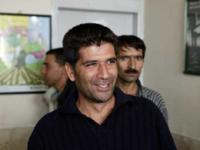
Feature Story
Spotlight on the Middle East and North Africa Region
27 January 2010
27 January 2010 27 January 2010
Credit: UNAIDS/P.Virot
The HIV epidemic in the Middle East and North Africa (MENA) region, while seldom highlighted, is steadily growing. In 2008 there were an estimated 310 000 people living with HIV, up from 200 000 in 2001. In that same year, approximately 35 000 people became newly infected with HIV in the region.
UNAIDS Executive Director Mr Michel Sidibé is in the region to draw attention to some of the key issues which need to be addressed to deliver an effective AIDS response, calling on countries to pursue equity and human rights in their approach to the HIV epidemic.
Let’s leverage the solidarity of the global AIDS response to draw closer together as a global family unit to end human suffering and stimulate human achievement.
Michel Sidibé, UNAIDS Executive Director
Stigma and discrimination remains key barriers to an effective regional response to AIDS and in many countries the criminalization of higher risk behaviors pushes affected communities underground–limiting access to HIV prevention, treatment, care and support services.
Given that populations at higher risk are disproportionally affected even in settings where overall HIV prevalence is low, for the good of the public health there is a need for acceptance. “Understanding is an imperative to draw those most at risk out of the shadows and enable them to protect themselves, and by extension, the entire community,” said Mr Sidibé.
UNAIDS’ work in the region
UNAIDS works closely with government and civil society partners in the region to advocate for the removal of punitive laws and polices that block an effective response.
In Yemen, on 29 August, the Parliament voted on a law to protect the rights of people living with HIV with the objective to reduce discrimination. This article 51 law is a major step to protect the rights of individuals living with HIV in the country.
In Egypt, an outreach programme for men who have sex with men has been initiated and in few months the project reached hundreds of people with services in a highly challenging environment. This programme is implemented by UNAIDS in partnerships with number of NGOs and with financial support from USAIDS and the Ford Foundation.
Another positive initiative was the first regional conference on Harm Reduction held in Lebanon last year. This conference was a break-through for the region and brought several experts and partners together and mobilized political support form parliamentarians, national governments and UN agencies.
Service provision for key populations is now also being expanded in the Middle East and North Africa region with oral substitution therapy for Injecting Drug Users programmes in Morocco and Lebanon. In Iran medical insurance is provided for people living with HIV and their families, where the insurance fees are completely paid buy the government. Theses success stories are significant and show investments towards universal access to HIV prevention, treatment, care and support much needed in the region.
Highlighting Human Rights at Qatar Conference
While in the region, Mr Sidibé attended the Colloquium on the Empowerment of the Family in the Modern World held in Doha, Qatar. Hosted by the Royal Family of Qatar and the Qatar Foundation in Doha, the Colloquium brings together scholars to discuss issues such as trends and challenges affecting the family, family and rights, and families around the world.
Families offer the first defence line against stigma and isolation and as well as the primary source of care.
Michel Sidibé, UNAIDS Executive Director
“Families offer the first defence line against stigma and isolation and as well as the primary source of care,” said Mr Sidibé in his key note address. The UNAIDS head also highlighted recent findings from the two year research project of the The Joint Learning Initiative on Children and HIV/AIDS. According to the report families take on approximately 90% of the financial cost of caring for infected and affected children.
Also of key concern is the freedom of movement for people living with HIV, disproportionally affecting migrant workers and their families. Qatar–as many others in the Middle East and North African region– imposes restriction on entry, stay and residence based on HIV status. Such restrictions are widely considered discriminatory and serve no public health benefit.
“Let’s leverage the solidarity of the global AIDS response to draw closer together as a global family unit to end human suffering and stimulate human achievement,” Mr Sidibé concluded his address.
Challenges ahead
To date, a shortage of timely and reliable epidemiological and behavioral data has hindered a clear understanding of the dynamics and trends of the HIV epidemic in the region. Although HIV prevalence remains low, populations at higher risk are often heavily affected; the epidemics in the countries of the region are typically concentrated among injecting drug users, men who have sex with men, sex workers and their clients.
Two broad transmission patterns have been identified. Firstly, many people are contracting HIV while living abroad, often exposing their sexual partners to infection upon their return to their home country. Secondly, HIV transmission is occurring within populations at higher risk such as injecting drug users or men who have sex with men, may also result in ongoing transmission to female sexual partners.
The UNAIDS 2009 AIDS Epidemic Update suggests intensified prevention efforts for the female sexual partners of men who are exposed to HIV during work abroad, drug use, sex with another man or sex with a sex worker.
Spotlight on the Middle East and North Africa Reg
Speeches:
Michel Sidibé, Executive Director of UNAIDS: Families on the Front Line of AIDS
Feature stories:
Middle East and North Africa : News archive
Insight into AIDS responses in Middle East and North Africa (04 Feb 2009)
World AIDS Day marked at Doha conference (01 Dec 2008)
External links:
Qatar Foundation
The Joint Learning Initiative on Children and HIV/AIDS


